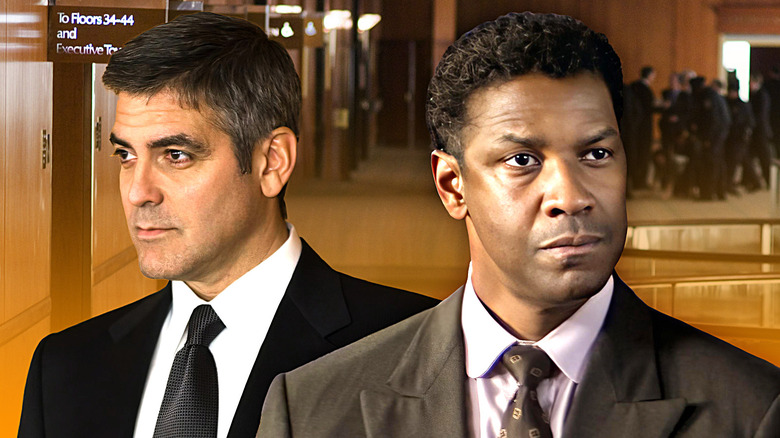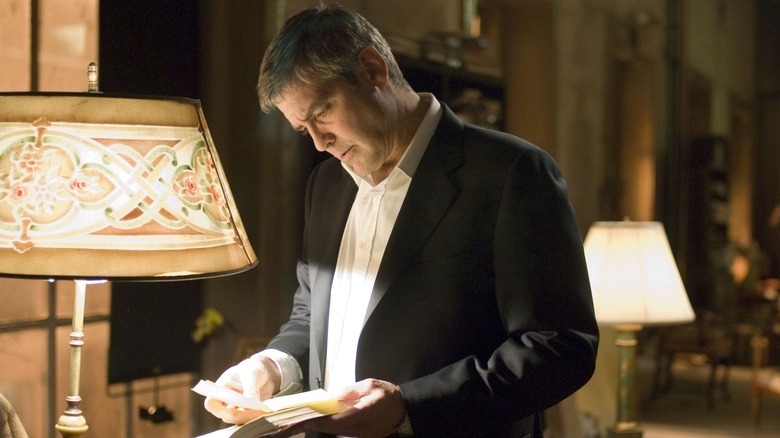Denzel Washington Regrets Turning Down One Of George Clooney's Best Movies
King Kong did not, in fact, have, er, doo-doo on Denzel Washington at the turn of the 21st century. Fresh off his second Oscar win (and his first as a lead performer) for playing dirty LAPD detective Alonzo Harris in Antoine Fuqua's "Training Day," the capital-M Movie Star made a habit of working with his old friends over the decade that followed. Indeed, if one were to run through his resume, one would note that most of Washington's films in the 2000s were directed by either one of his former collaborators or Denzel himself. Then again, if your pals were Spike Lee, Tony Scott, Jonathan Demme, and the under-appreciated Carl Franklin, you'd want to make all of your movies with them too.
Not that any of this was out of character for Washington, an artist who's been meticulous about cultivating his screen image since making his film acting debut in the punching bag that was Michael Schultz's 1981 dramedy "Carbon Copy" (oft considered Washington's all-time worst movie). He also barely ever joins forces with directors who haven't already got a hit film or more under their belt by the time they work together, itself a lesson he took to heart after making one of his other rare movies of ill repute, 1990's "Heart Condition," with TV helmer turned first-time feature director James D. Parriott. Thanks to this unofficial policy of his, Washington has yet to endure a professional slump that extends beyond a single film.
There are, of course, certain drawbacks to never (or, rather, almost never) taking chances on directors who're wet behind the ears. Washington learned that the hard way he passed on 2007's "Michael Clayton," which would go on to become a George Clooney classic instead.
Washington missed out on playing Michael Clayton
For as much as Washington might regret passing on Brad Pitt's role in "Seven," you can see why the material didn't immediately grab him. Pitt's character, Detective David Mills, is reckless and hot-headed, which makes him vulnerable to psychological manipulation. Denzel, on the other hand, tends to play men of principle; even Alonzo Harris is principled about not being principled. Whatever it is Washington's characters believe in, they hold steadfast to those beliefs, which makes them either stubborn or strong-willed depending on the situation. That also makes them a lot like Michael Clayton, a legal fixer whose very profession requires him to be rigid about not believing in anything. This, in turn, is why Michael's redemption arc in the film feels so satisfying and hard-won; when he delivers a furious monologue about his lack of scruples ("I'm not the guy you kill. I'm the guy you buy!"), we know he isn't exaggerating, having seen the evidence with our very eyes.
It's not difficult to picture Washington making a meal out of that moment, either, and one suspects Washington feels the same way. As he told GQ in 2012, "Seven" and "Michael Clayton" are the only two projects he regrets turning down. "With 'Clayton,' it was the best material I had read in a long time, but I was nervous about a first-time director, and I was wrong. It happens," he added. Did he have an easier time imagining himself as Clooney's bereft attorney than Pitt's impulsive cop? Washington didn't say, but one suspects he did, which undoubtedly made it hurt that much more.
"Michael Clayton" writer/director Tony Gilroy had, in fact, never helmed a film before that. In his case, though, Denzel would've been better served focusing less on Gilroy's inexperience as a director and more on his previous output as a writer, which included the acclaimed Stephen King movie "Dolores Claiborne" and "The Bourne Identity" (one of the most influential action films of the century). That may also partly account for Washington's lack of hesitancy when Tony Gilroy's brother, Dan Gilroy, approached Denzel about starring in his own legal drama, "Roman J. Israel, Esq.," 10 years later. The outcome wasn't another modern masterpiece, but it did give Washington his favorite role.

